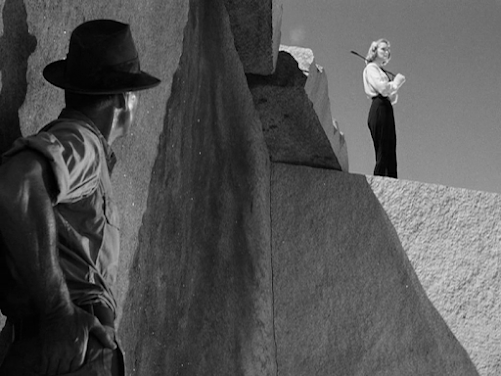Down With... Architecture!??
Okay, folks, this one is just plain bonkers.
We've had a month or so of fairly heavy films that tackle some difficult topics (Evolution; Witch-burning; Segregation; Rape.. nice, uncontentious subjects) so it's about time we pause for some refreshment.
The rest of March is going to be fun, fun, fun.
Say hello to Ayn Rand.
Ayn Rand was born in Russia to a well-educated, upper-middle class Jewish family. The October Revolution of 1917 brought her comfortable childhood to a very sudden and violent end (she was twelve at the time) and her family lost absolutely everything. By the time she was able to travel to the United States in 1926, she had cultivated what was to become a life-long visceral hatred for Communism, or indeed for any remotely collectivist philosophy.
She wasn't merely opposed to the Soviet Union (which you can sort of understand, given what happened to her family); she was violently opposed to any obligations that might be imposed upon the individual for the benefit of society.
In her fiction, this philosophy of life manifested as a slightly bizarre, capitalistic re-working of Nietzsche. Her heroes are the visionary, creative men who have the genius to create and to build, and are therefore held above the rest of the faceless mob (who only want to topple the Great Ones anyway).
It would be fun, were it not for the sheer number of dangerously crazy politicians who take her ideas at face value and use her as an excuse to abolish Social Security, Healthcare, Safety Regulations, Public Roadworks, or indeed anything that imposes an obligation on individual freedoms.
In The Fountainhead, Rand's superman is the architect Howard Roark (played in the film by a slightly bewildered Gary Cooper). Roark is the perfect Ayn Rand protagonist: a rugged individualist who refuses to compromise his principles for anyone, despite the pressures brought to bear on him by the soulless minions of orthodoxy.
In Ayn Rand-world, we are supposed to accept that Roark's ultra-modern architectural style is too avant-garde and uncompromising for the backward establishment, or for the public at large.
Meanwhile, back in Reality, modern architecture was enormously popular, and architects like Frank Lloyd Wright (whose style is very obviously the inspiration for Howard Roark) were enjoying critical and popular success.
Rand also conveniently glosses over the fact that architecture is, by definition, a functional art form. If an author, for example, wants to write a hyper-modern novel in a style that will be incomprehensible to all but the very, very aware, he or she is absolutely free to do so; no one is going to stop them. The wider public will then be free to read it or not read it, as they choose.
But an architect is not simply an abstract artist. A building is to be lived in, often by the people who are paying for it. As an architect, Howard Roark doesn't just have an audience, he has clients, and eventually, his buildings have occupants.
According to Ayn Rand, the creative genius is the only one whose judgment should be considered. Should anyone else voice an opinion, that is an unacceptable infringement on the individual freedoms of the superman.
Needless to say, this is a philosophy that can very easily draw a society into some very dark places.
Having said all that, the 1949 film adaptation of The Fountainhead is enormously fun (as long as you don't try to turn it into a religion) and the sexual chemistry between Gary Cooper and Patricia Neal is very real (very very real, actually).
And then of course there's the ultra-romantic, pseudo-Wagnerian musical score by Max Steiner, which manages to perfectly compliment and completely demolish Ayn Rand's philosophy simultaneously.
We will be screening The Fountainhead at 7.30 on Thursday, the 9th of March, at the Victoria Park Baptist Church.














I thought Gary Cooper was gay and had a thing about James Dean in Dean's last film (I forget its name) and that their co star Elizabeth Taylor felt rather excluded.
ReplyDeleteI think you're thinking of Rock Hudson, not Gary Cooper!
DeleteRock Hudson was definitely gay, and he was in Dean's final film (Giant) but they apparently didn't get along very well.
Gary Cooper never worked with James Dean (as far as I know) and he was quite unambiguously straight ("As straight as Attila the Hun," as David Hemmings once said about himself).
Cooper and Patricia Neal met while working on The Fountainhead, and had a lengthy and very serious affair. The sexual chemistry between them in this film is very obvious, and very real (much to Ayn Rand's annoyance, I believe; she had pushed for Cooper to play the role because she was interested, but Cooper ignored her completely, and went straight for Neal).
Indeed, you're right, I was thinking of Rock Hudson!
Delete